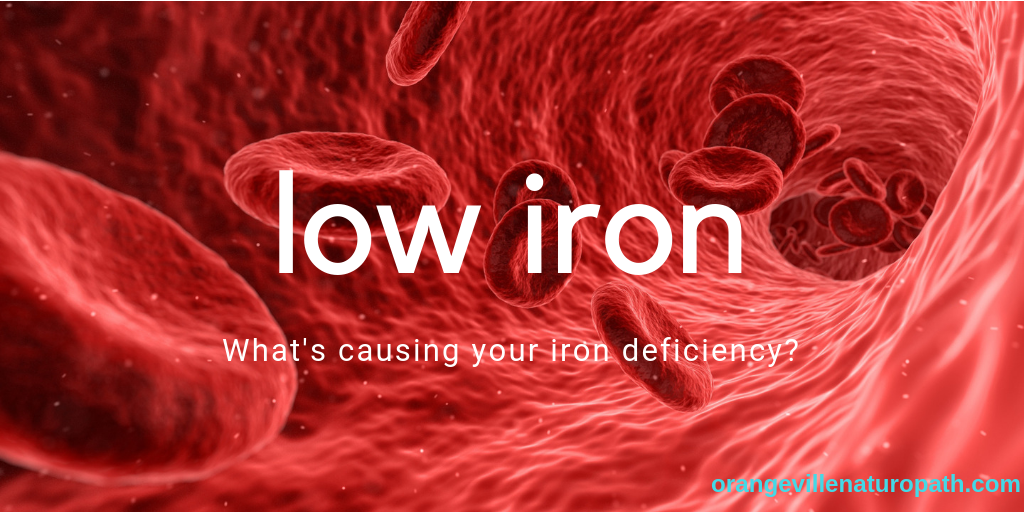
Iron deficiency, or anemia, is a very common diagnosis for women. It's so common, in fact, that we often accept it as 'normal' or no big deal. Well, guess what? Yet again, just because something is common does not make it normal.
The symptoms of iron deficiency are: fatigue, exhaustion, pale skin, frequent colds or other infections, feeling cold, shortness of breath, noticeable heartbeat, dizziness, headaches, swollen tongue, trouble swallowing, spoon-shaped or brittle nails, leg pains, hair loss, or a desire to eat non-food items like ice.
As with most of the vitamins, the common lab reference ranges (the range which is considered acceptable) do not reflect optimal nutrient levels. This means, that when you have bloodwork done, you may be told that everything is normal - and yet you are one point away from being deficient. As you know, to me that one point is significant. There is no imaginary line that defines when we have symptoms and when we do not because health is a continuum. This explains why many women can be diagnosed with iron deficiency on and off throughout their lives. The other reason is that the cause of the deficiency has not been addressed. Let's go through some of the reasons why you might have low iron.
1. Blood Loss
- Whether you have heavy periods or a hemorrhoid (both are treatable, by the way), it's important to first consider any reasons why you might be losing blood. Blood loss through the colon, even if you can't see it, is a huge red flag for colon cancer and must be treated urgently. A bleeding ulcer is another origin for digestive blood loss, and could be caused by pain medications irritating the stomach.
2. Not Getting Enough Iron in Your Diet
- When we think of Iron, we often think of red meat but there are plenty of other foods that contain iron as well:
spinach, shellfish, lentils, pumpkin seeds, quinoa, broccoli, dark chocolate, tofu, turkey Here's a great reference
- Women who are menstruating need at least 18mg of iron per day, while Men & menopausal Women require a minimum 8mg/day. The need for pregnant women is much higher at 27mg/day.
3. Not Absorbing Iron
- Plant sources of iron are not as well absorbed by the body as animal sources, so you need to consider this if you are following a vegetarian or vegan style of eating.
- Vitamin C helps to improve the absorption of iron and you will notice that some iron supplements suggest taking it with a glass of orange juice or else they contain Vitamin C right in the capsule.
- Many different medications interfere with our digestive processes. Our stomach acids start the process of protein digestion, and iron is absorbed in the first part of the small intestine. Stomach acid levels are interfered with by antacids including TUMS or other prescription Proton-Pump Inhibitors. Furthermore, pain medications like Aspirin or Ibuprofen are known for irritating the stomach lining, and consequently the stomach cannot efficiently do it's job to break down proteins, which leads to poor iron absorption as well.
- the heavy metal lead competes with iron, and so a lead toxicity can lead to iron deficiency
- Drinking tea with meals because the tannins in tea block iron absorption (a trick to use if your iron levels are too high)
- Any digestive condition that leads to poor digestive ability or inflammation in the digestive tract like Celiac disease, food sensitivities, irritable bowel diseases like Chron's or Colitis
- Chronic infection
- Iron absorption is tightly regulated by the body, so we can only absorb so much each day. Eating a ton of iron one day and none the rest of the week will not maintain iron stores in the body. Just like taking huge doses of an iron supplement will only lead to constipation since the majority of the iron simply passes through.
4. Other Conditions to Think About
- We know that having low iron often goes hand in hand with low thyroid function. The symptoms of each are very similar, and both should be considered if you have been diagnosed with one or other
- Kidney disease can impair the ability to make Red Blood Cells, which will show up as anemia in lab work
To me, the why is just as important as the diagnosis. I like to understand where things are going wrong so that we can fix it for good. Your body deserves to be working at it's best, and by healing the root cause of your issues we can make that happen.
Nettle Root (tea bag or 2 tsp of loose leaf)
1/4 fresh lemon
1 tsp blackstrap mollasses
boiling water







 RSS Feed
RSS Feed